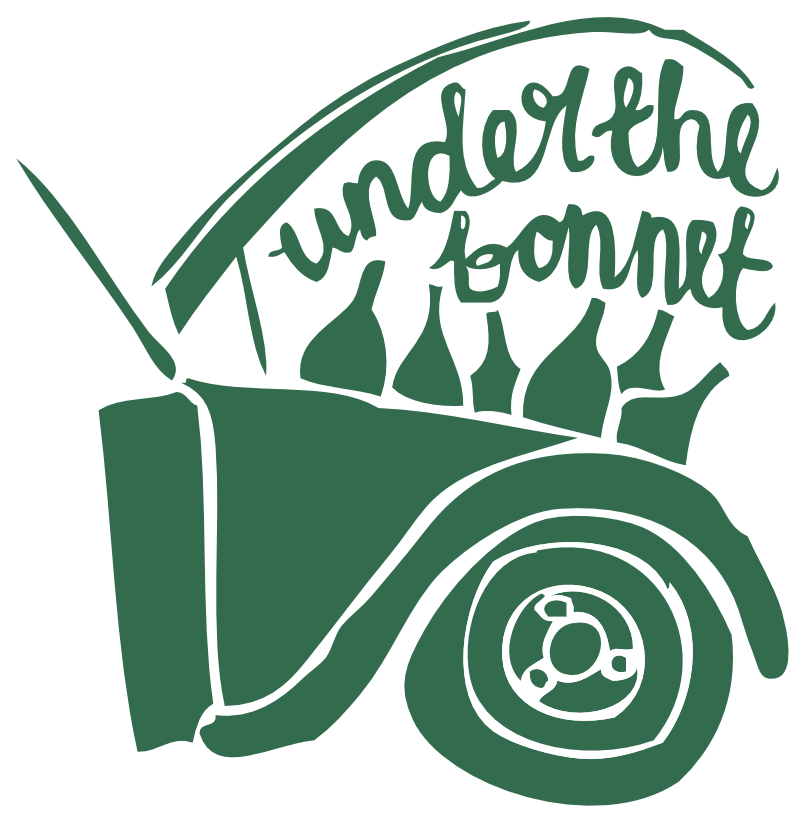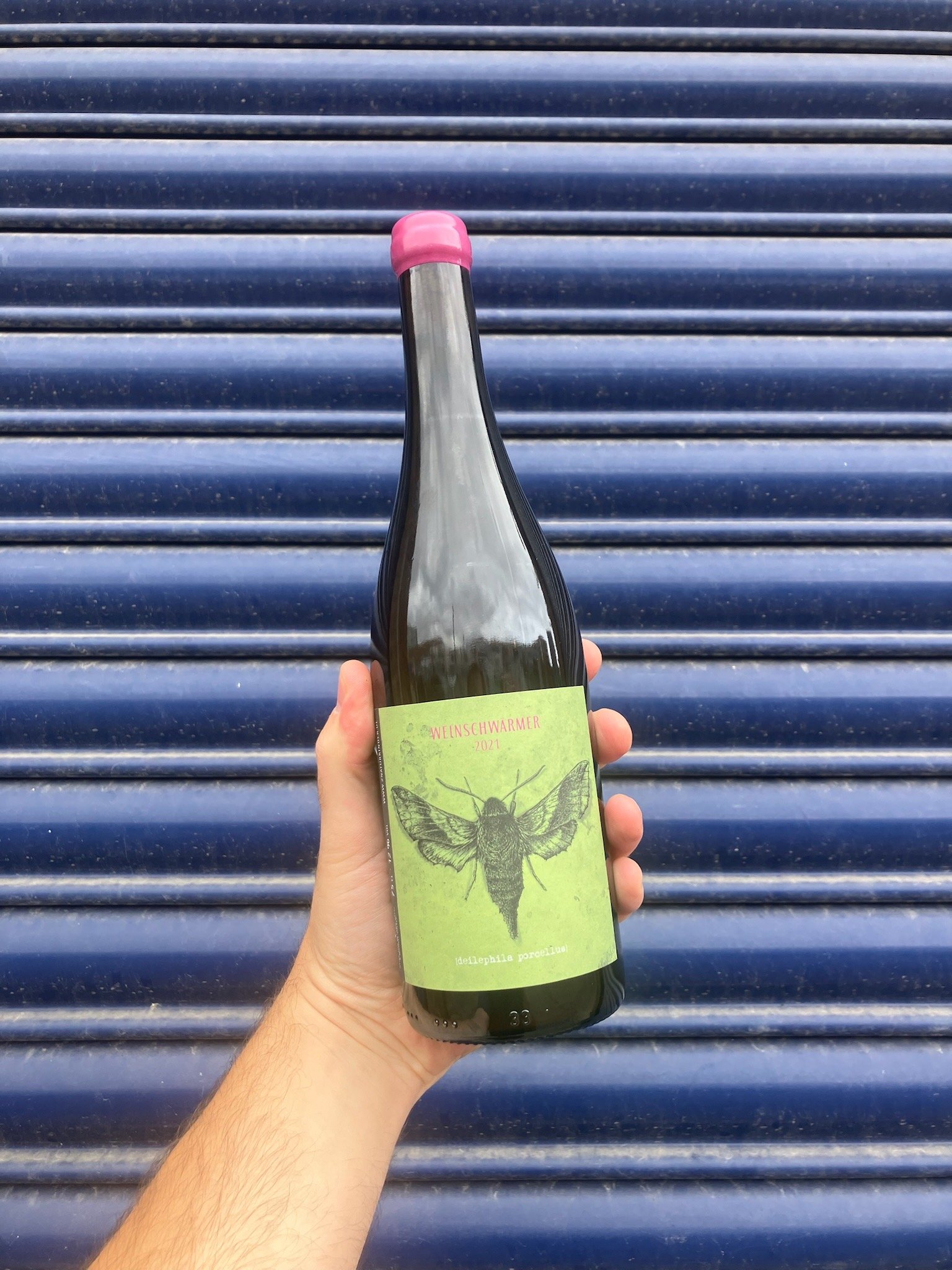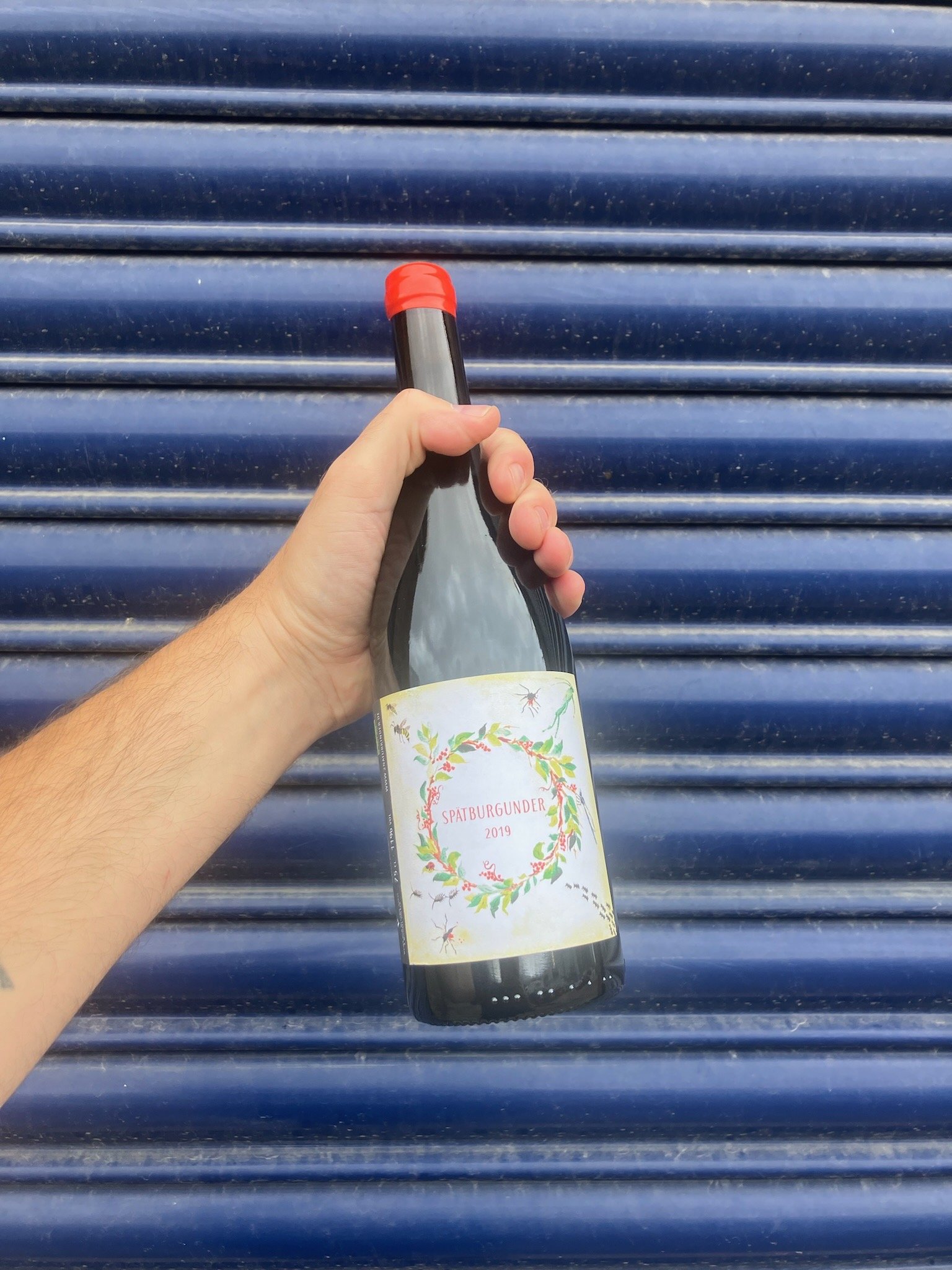It's a true thrill to be able to release new wines from Melanie & Michael at 2Naturkinder. Among them are very special releases from their 10th vintage, resplendent in the new labels (and new names in some instances) that the wines will share moving forwards.
Watching Melanie, Michael and their development over the last decade (8 of those years working together) has been a huge privilege.
Spread across the Eselberg hill in Kitzingen, Franconia, the 2Naturkinder project unfolded from a hopeful experiment with one family parcel in 2013 (the Heimat Silvaner) to now farming all six hectares. They produce carefully considered expressions of their sloping vineyards on shell limestone.
Having worked no-till since 2016, and experimenting with biodynamic treatments in 2021, the organic approach has become even more holistic and locally-minded, swapping biodynamic preps for compost teas and "Effective Microorganisms" (to encourage a healthy rot in the cover crops) - dramatically increasing soil health and diversity.
An exciting development -and one we've kept a close eye on since they planted it in 2018 - is the first wine from the 'garden vineyard' - planted to the centuries-old field blend of nearly 20 varieties, known historically as 'Frentsch'. The wine, Siebenschläfer is a co-fermentation of the entire yield from this special vineyard: a kaleidoscope of aromatics and fruit.
We're also particularly pleased to have received the dazzling new vintage of Black Betty, the welcome return of a new Vater & Sohn, and 'Wilde Meute' - the new moniker for the longstanding skinsy favourite Drei Freunde.
All the wines are available now and detailed in full below:
NEW FROM MELANIE & MICHAEL
WHITE
NV - Vater & Sohn - Muller Thurgau, Silvaner, Riesling
"The Vater & Sohn is a multi-vineyard white blend (named in homage to the time when Michael and his dad still worked on blends together.) that now features the fruit from the vines once picked for Fledermaus Weiss: Müller-Thurgau is the main act here. Grapes all get stomped and pressed shortly after. Same happens to the grapes of one Silvaner vineyard. Fermentation and aging happens partly in big barrels, partly in steel. The wine stays on the lees until the following summer to be finally blended with a splash of Riesling and bottled after harvest, with no additions."
SKINS
2022 - Wilde Meute - Silvaner, Bacchus, Muller-Thurgau
A new name and label for Drei Freunde - the three birds here a nod to its original 'three friends' moniker, once named for the three most widely planted varieties in Franconia that the blend champions.
"Wilde Meute (“wild bunch”) is our skin-contact blend. The defining varieties are Bacchus and Silvaner with a splash of Müller-Thurgau. Bacchus, an aromatic crossing of Silvaner and Riesling, gets destemmed, stays on the skins for about a week and tends to finish fermentation in stainless steel where it stays on the full lees for the next ten months. Silvaner and Müller-Thurgau get vinified the same way but continue their journey after fermentation in Franconian oak. Bottled October 2023 with no additions."
2021 - Kleine Heimat - Silvaner
"The Kleine Heimat (“little home”) is a single vineyard Silvaner from one of our satellite vineyards next to the village of Rödelsee. Unlike the rest of our vineyards the bedrock soil is Keuper. Fruit is destemmed and macerated for 7 days before fermentation starts. Pressed after another week, fermentation continues in a big oak barrel. That’s where the wine also ages until being racked to a tank before the next harvest where it stays before it gets bottled about 18 months after being picked. No additions."
2021 - Weinschwärmer - Pinot Gris, Riesling
"The Weinschwärmer (the German name of the small elephant hawk-moth) is a blend of Pinot Gris and Riesling. The varieties grow next to each other on a stand-alone limestone hill close to the winery. To extract the beautiful Pinot Gris color and fruitiness we destem the bunches and let the crushed berries ferment on the skins for about 10 days. Our last picking day usually is our Riesling, which gets pressed directly. Both wines age in a big old oak barrel before they get racked and blended the following summer to stay in a tank for another six months before being bottled."
"The idea of the wine is to have a very ripe, rather low-acid Pinot Gris providing colour, texture, and fruit before 20-30% of direct-press Riesling jumps in that gap with razor-sharp acidity to add another layer of complexity."
2020 - Heimat Silvaner - Silvaner
"The Heimat (“home”) is the Silvaner parcel it all started with. 40 year old vines grow on a limestone hill close to the winery, a vineyard that has been farmed organically since the 1990s. Over time we leased two equally old Silvaner plots right next to it so we make versions of each parcel and take the best barrels for the final blend. The heart of the wine is a classic destemmed and crushed skin-fermentation for about two weeks, aged in old oak barrels. A small batch gets destemmed by hand for a carbonic maceration. The following summer all barrels get racked and the final blend goes in a tank for another six months before being bottled with no additions."
2021 - Siebenschläfer - "Frentsch" Ancient Field Blend
There is such a huge historical story to tell with the Frentsch field blend that makes up the Siebenschläfer - so we'll do a separate post digging deep into this very special vineyard, and wine. With just one barrel produced in 2021, we have tiny quantities available. A little more info below from Melanie & Michael:
"The Siebenschläfer (German for “edible dormouse”) comes from the first vineyard we planted ourselves. It’s a field-blend historically called 'Frentsch' - the way it’s been planted in our region for centuries until single varieties took over the show. Co-planted in the vineyard you find green, yellow and blue Silvaner, Bukettsilvaner, Heunisch, Gewürztraminer, red and yellow Muskateller, Riesling, Weißburgunder, Grauburgunder and Spätburgunder, Vogelfränkisch, Adelfränkisch, Lagler, Kleinberger and Elbling. The mix was a traditional insurance policy against the weather: different varieties thrive in different conditions, so you could always guarantee some yield."
"The 2021 is the first vintage: everything was picked together, destemmed and fermented on the skins for about a week. The fermentation finishes in old oak where the wine stays until it gets racked the following summer to stay in a tank for another six months."
"All those varieties make for an incredibly unique and complex wine with a touch of color that comes from the red skinned varieties, muscatel flavors, a gentle red berry fruit and a mineral Silvaner backbone."
RED
2022 - Black Betty - Domina, Regent, Pinot Noir
"Black Betty is our light red. Named after the first sheep born in our vineyards, the blend has changed over time as Betty grew up and older. Domina – a crossing of Blauer Portugieser and Spätburgunder – and Regent – a hybrid crossing of Diana (Müller-Thurgau x Silvaner) and Chambourcin – define this blend. We press the Regent bunches directly and pour it over the Domina bunches picked shortly after for just a touch of color and tannin extraction before pressing a few days later. The wines age in big old oak barrels before they get racked the following summer and blended with a small but noticeable batch of carbonic Spätburgunder making an incredibly juicy, glou-glou-style wine."
2019 - Spätburgunder - Pinot Noir
"Our Spätburgunder (Pinot Noir) comes from an old limestone vineyard next to the town of Volkach. With our first vintage in 2015 we drafted our new idea of German Pinot: high acid, light, neutral oak. So we pick relatively early (at least for our region), alcohol is not that important to us here. A layer of whole bunches gets covered by destemmed and crushed berries. When fermentation is finished we press and put the wine in an old, neutral barrel so the wine can breathe but doesn’t pick up oak flavors. The following summer the wine gets racked and moves to a tank where it stays for at least another 18 months before being bottled."










